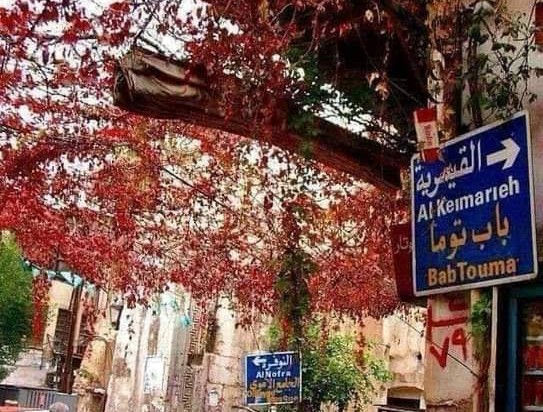
Nadia is a working single mom of a college student, who shared with us her experiences on being half Jordanian & half Syrian while living in Amman. Nadia lived between Jordan and Syria for 30 years then moved to Amman in 2010 before the Syrian war broke out. As a proud Jordanian, she did not do this interview to complain about her country, but rather hopes that her experiences may contribute to improving the treatment of Syrians.
Jordanian and Syrian culture differ in many aspects. From my perspective, seeking higher education is more common in Jordan, whereas Syrians are more likely to focus on becoming business owners & manufacturers. Although Jordan and Syria border each other, their cuisine & social gatherings are different. The opportunities for women differs in each country with there being more job opportunities available for women in Jordan.
My experience was different based on two phases: pre-war and post-war. Before the war, I was treated with respect and I always felt safe. Since the war, I have only visited Syria once so I don’t have too much knowledge of what it is like now. However, I feel less safe & hesitant about visiting Syria with a Jordanian nationality.
It’s weird because when I lived in Damascus, I felt that it was my home and that I was an outsider to Jordan, but now I feel that Amman is my home. I remember returning to Syria after the war expecting to see the same Syria as before, but it is something completely different now. It is hard feeling like a stranger within your own country & with your family. The separation from my Syrian family was not based on political views, but rather due to the war changing their socioeconomic situation, the way they talk, their traditions and day-to-day practices.
My experiences in Jordan also differ based on Syria pre-war and post-war. Before the war, Jordanians would admire Syrian dishes, clothing, traditions, & TV series. I never felt the need to change my Syrian accent. However, this attitude changed after the war and I started to feel like I was being treated as a refugee. Although I am half Jordanian & hold dual nationality, I am viewed as a second-class citizen due to my Syrian accent & family name.
I remember having an experience with a female co-worker who asked if I was a ‘new or old Syrian’. ‘Old Syrians’ were the first wave of Syrians that moved to Jordan as business owners and investors years before the war. ‘Old Syrians’ are well liked by Jordanians since they are viewed as old money. When she asked me this, I wasn’t sure what she meant at the time, so I told her I was a ‘new Syrian’ and her friendliness towards me completely changed.
At a company I worked at, we had an experience with an angry client. I was the first person welcoming him and tried to help him by solving his issue, but when we ran out of options he told me, “We are the ones that allowed you to live in our country. You are here only to serve me, nothing more. So make it possible.” Another time, a professor wasn’t happy about the services being provided by the company. Instead of expressing his dissatisfaction with respect, he verbally assaulted me while I was trying to help him. My colleague, who was an Iraqi woman, came to help, but he physically assaulted her. This is not only an example of prejudice, but also an example of violence against women. After assaulting us, he walked away shouting, “Isn’t there a man here!!” I think that the professor acted this way towards us since we are women and are from different ethnicities. This is quite alarming since he is a professor who is responsible for teaching younger generations.
Unfortunately, both Syrian and Jordanian media contributed to creating a negative attitude towards Syrians. During the war, Syrian television series stigmatized the ‘new Syrians’ arriving in other countries as cheaters, thieves, and low class. I believe the media used extreme stereotypes to attract more viewers.
When I moved to Amman in 2010, there was no Jordanian mainstream media about Syrians. But once the war started, I began noticing that the Syrian conflict was everywhere. All of a sudden, the increase in Amman’s traffic & shortage of water was being blamed on the Syrian conflict. Syrians were solely being blamed for Jordan’s economic issues due to Syrian workers affecting Jordanian unemployment. However, in 2018, I started to notice a positive shift in the public narrative. The blame for Jordanian unemployment changed to Syrian workers contributing to the GDP. By the media highlighting the importance of Syrians in Jordan, I believe it contributed to changing many Jordanians’ attitudes.
Both NGOs and government programs are focused on integrating Syrians into Jordanian society. I have benefited greatly from the Queen Rania Foundation (QRF) & Jordan River Foundation (JRF). I am grateful for the free courses and support these organizations provide as I was able to build my personal & professional skills. QRF & JRF focuses on women empowerment and their policy does not inquire about nationality, allowing for everyone to be treated equally. I am thankful for the Justice Center for Legal Aid (JCLA), which provides free access to lawyers & consultations for all nationalities. Recently, I received my certificate from the Crown Prince Foundation (CPF) & Google in Digital Marketing, which was part of their program: Maharat Min Google.
I am grateful for the programs & organizations available in Jordan for Syrian & Jordanian women to build their skills. Although I have faced some negative experiences in Jordan for being half Syrian, I have also had many remarkable experiences. I love both Jordan & Syria and want people to see the beauty in each other to build tolerance & understanding towards one another.